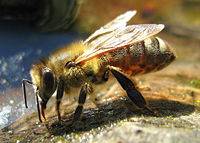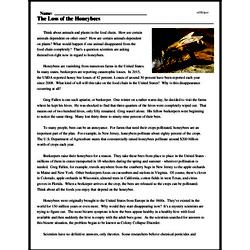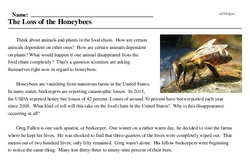The Loss of the Honeybees
Think about animals and plants in the food chain. How are certain animals dependent on other ones? How are certain animals dependent on plants? What would happen if one animal disappeared from the food chain completely? That's a question scientists are asking themselves right now in regard to honeybees.
Honeybees are vanishing from numerous farms in the United States. In many states, beekeepers are reporting catastrophic losses. In 2015, the USDA reported honey bee losses of 42 percent. Losses of around 30 percent have been reported each year since 2008. What kind of toll will this take on the food chain in the United States? Why is this disappearance occurring at all?
Greg Fallen is one such apiarist, or beekeeper. One winter on a rather warm day, he decided to visit the farms where he kept his hives. He was shocked to find that three-quarters of the hives were completely wiped out. That means out of two hundred hives, only fifty remained. Greg wasn't alone. His fellow beekeepers were beginning to notice the same thing. Many lost thirty-three to ninety-nine percent of their bees.
To many people, bees can be an annoyance. For farms that need their crops pollinated, honeybees are an important part of the plan. For example, in New Jersey, honeybees pollinate about eighty percent of the crops. The U.S. Department of Agriculture states that commercially raised honeybees pollinate around $200 billion worth of crops each year.
Beekeepers raise their honeybees for a reason. They take these bees from place to place in the United States - millions of them in crates transported in 18-wheelers during the spring and summer - wherever pollination is needed. Greg Fallen, for example, travels anywhere from the cranberry bogs in New Jersey to the apple orchards in Maine and New York. Other beekeepers focus on cucumbers and melons in Virginia. Of course, there's clover in Colorado, apple orchards in Wisconsin, almond trees in California, cotton fields in west Texas, and citrus groves in Florida. When a beekeeper arrives at the crop, the bees are released so the crops can be pollinated. Think about all the foods you enjoy that depend on the honeybee.




